SEO
The Small Business Reputation Management Guide

When you hear the phrase “reputation management” your mind might conjure ideas of crisis talks and PR executives looking flustered.
You might imagine boardrooms of busy lawyers and a stressed CEO.
In reality, good reputation management starts long before – and hopefully in lieu of – any PR nightmares.
Reputation management is about making sure your business is highly regarded within its industry by its customers and the general public.
A good reputation management strategy will extend to both the online and offline, but for the sake of this guide, we’ll be focusing on the ways that small businesses can protect and bolster their image online.
Who Should Have A Reputation Management Strategy?
It might feel like a reputation management strategy is only needed by large, public-facing companies. This just isn’t the case.
Any company can be the subject of negative reviews, competitor takedowns, and plain, old misunderstandings. You don’t need to be in a particularly litigious sector or have controversial staff.
Online reputation management is about enabling your business to own as much of the space where it’s being talked about as possible. It enables you to steer conversations about your brand. You can identify and rectify any brewing issues.
Customers
If you have customers, whether B2B or B2C, you are likely subject to reviews. As such, it is really important that you have a reputation management plan in place to deal with any negative reviews or press.
Competitors
If you have particularly aggressive competitors, you might be subject to negative attacks on social media or through reviews.
Just because you haven’t had any trouble with your current competitors doesn’t mean you won’t in the future.
Having a plan in place for how to deal with any negative attacks if they arise can save you a lot of trouble down the line.
Employees
As much as you try to value and honor your employees, sometimes working relationships can sour. Disgruntled employees can be very damaging to a brand.
It’s important that, if you work with staff or contractors, you fully understand the impact they could have on your business’s reputation.
Where Online Should You Focus Your Strategy?
It will not just be the obvious places like social media that you need to consider in your reputation management. There are many places online where both positive and negative brand influences can spread.
Search Engines
Search engines are often the first port of call when a potential consumer or journalist is trying o find out more about your organization.
When your brand is searched for, your website is likely to only take up one or two positions on the search engine results pages (SERPs). There will be many other spaces on the front page of the results where other mentions of your brand will be ranking.
These can be purely informational, like directories, or they could be more influential, like press articles or pages about your brand on competitors’ sites.
Review Sites
There are plenty of sites online that provide consumers with places to share their experiences of your brand, both positive and negative.
These might be industry-specific, as part of marketplaces like Amazon and eBay, or more general, like Trustpilot and Yelp.
Search Engine Profiles
Beyond the pages that mention your brand that the search engines are ranking, there are also features like Bing Places and Google Business Profile that have information about your business and allow reviews to be left.
These profiles may not even have been set up by you, they may have been created by the search engines themselves based on data they have taken from other trusted sources.
Social Media
Your brand is likely being talked about on social media sites if you are a B2C business – even if you don’t have a presence on the platform.
Your customers might be speaking about you and not tagging you.
Social media is a great place to get a sense of what the general sentiment around your brand is, but remember that opinions move quickly on social.
Forums
Platforms like Reddit are almost social media lite.
They allow users to discuss brands and experiences with products and services, all anonymously.
More specialist forums specific to your industry will likely have entire boards dedicated to particular issues with brands and their services.
Why Is Reputation Management Important?
Many potential customers go online to find out more about a business before they engage with it. They may be looking specifically for others’ complaints and problems – or they might be looking for information about your opening hours.
Regardless, if they search your brand and see negative reviews and comments, it may be the difference between winning that new customer and losing them.
Similarly, if a current customer comes across stories of problems with your brand whilst on a forum or social media platform, it will likely color their own experiences with you.
A PR crisis is an obvious reason to care about your reputation, but by the time the media is running with a story, it’s often too late to limit the damage.
When Should You Consider A Reputation Management Strategy?
You need to work on your plan to proactively protect and build your brand’s reputation now. The more you can help to influence the conversations around your company now, the easier it is to present a positive image in the long term.
This means monitoring your brand’s mentions online – not just waiting to be alerted via a social media tag, but carrying out a full audit now and regularly monitoring mentions going forwards.
You should assign a member of your team who can carry out regular checks and also empower them with the right tools to automate it where possible.
This doesn’t have to be expensive; Google Alerts allows brands to select terms they want to be alerted to when they are used online. As a minimum, set these up for your brand name and the names of any well-known people in your company.
How To Audit Your Reputation
Your first step should be to carry out an audit of your brand’s reputation to find out what is being said about you.
Search For Your Brand
Go to the major search engines for your country and search for your brand. See what comes up in the search results.
How much of the first page of the search results are webpages, social media profiles, and review pages that your business controls? The goal is to have as much of that front page of your brand’s search results controlled by your company as possible.
Carrying this out for Search Engine Journal on Google shows the company’s own website, a Google Knowledge Graph entry, and a People Also Ask section.
Knowledge Graph
The Google Knowledge Graph is something that your business cannot control directly, but can influence.
If, when looking for your brand, you notice that yours is incorrect or missing entirely, I’d recommend reviewing Dixon Jones’ excellent guide on the Knowledge Graph here and Aleh Barysevich’s guide here.
People Also Ask
The People Also Ask section on Google SERPs is a great way of quickly identifying any negative sentiment about your brand.
For example, if your brand search reveals a People Also Ask section that contains questions like “Is [company] a scam?” or “Is [company] expensive?” you know that there is potentially some negative sentiment surrounding your brand.
If these negative People Also Ask questions are appearing on your brand search, it is imperative that you see what the SERPs or those questions look like. If they are not positive, you need to try to rank your own content as an answer to those questions.
This will give you the opportunity to give a more favorable answer than is currently being ranked.
Be Brave And Look For The Negative Press
Search for your brand plus “reviews/scam/alternatives/pricing” and look at what is ranking in the SERPs. Also, check if that changes the People Also Ask questions to something more divisive.
You may well uncover some reviews or forums that you aren’t even aware of through these sorts of searches, but they will help you identify if there is more negative content about your brand out there online.
Search Engine Profiles
When searching on Google you may notice your Business Profile appear. This is something that you can directly control.
You are able to correct any misinformation on factual items like opening times and location, but you can also flag inappropriate reviews and answer questions.
It’s very important to keep on top of these business profiles and make sure that you are answering any questions that are asked through them so that the general public, who can also answer them, doesn’t give misleading or unfavorable responses.
Bing Places and Apple Maps are other common business profiles that you may have set up and forgotten about, or that were set up automatically. Make sure you are checking these regularly.
Social Media
Go to each of the main social media platforms that are popular in the countries where your customers are located. This might not just be the platforms you have a profile on.
A search of your brand will help you to identify if you are already being spoken about.
Look at competitors’ accounts, too, and see if they are receiving mentions with your brand included. You may notice favorable or unfavorable comparisons, or recommendations to switch to or from your business.
Reddit And Forums
Reddit is partially a forum and partially a social media platform.
Don’t forget about it when you are auditing your online reputation. Try to be a part of the communities (subreddits) that discuss your industry, or if you are a local business, review what’s being said on your town or city’s subreddit.
You might not be named directly but alluded to as part of these local conversations. For instance, “the shop at the end of the road on King Street” and therefore might not find your business being talked about through a brand search only.
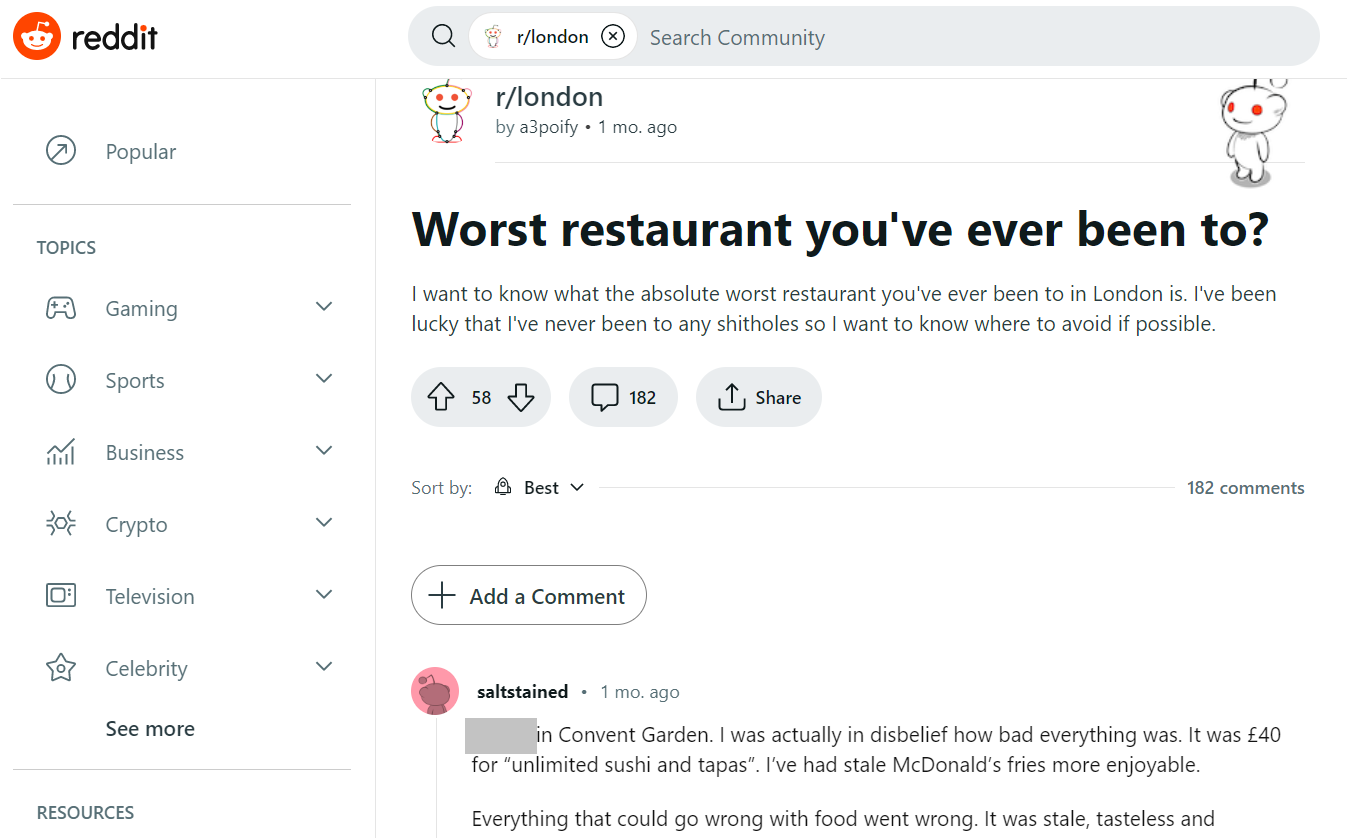 Screenshot from Reddit, May 2023
Screenshot from Reddit, May 2023
In a similar way, make sure you are keeping up with what is being discussed on industry or location-relevant forums online.
Look At Comparison Pages
Whilst you are reviewing what the SERPs say about your brand, you might notice a few of your competitors are comparing your brand with theirs. Comparison pages are not that uncommon, especially in service software and technology industries.
If the comparisons are inaccurate or unjust, you may wish to contact your competitor and have them rectify the information.
If they are outright untrue and your competitor is not willing to correct the misinformation, you may need to seek legal advice.
Own A Presence Wherever You Can Where You Are Being Talked About
A very proactive approach to reputation management for smaller businesses is simply making sure you own a profile wherever your business is likely to be talked about. For example, claim social media profiles on the main platforms where you are being discussed.
This gives you a central place to monitor mentions and also correct misinformation. It will also help you to dominate the first page of the organic SERPs on Google and Bing.
These high-authority social media sites’ brand-owned profiles often rank highly for relevant brand searches.
If you can claim or set up a profile on your relevant review, directory, and comparison sites, you will be able to respond to negative comments and reviews.
You can also answer questions asked about your company that might otherwise be answered by competitors or the public.
Deal Well With Reviews
Something that sounds simple but often doesn’t play out as intended is taking the high road with unfavorable reviews.
It can be hard to respond politely when you receive a review from a disgruntled customer complaining that the music in your café was too loud, or there were too many families at your play center.
It’s rare that a company biting back at negative reviews will come out of the fight unscathed.
Respond Positively To Unfavorable Reviews!
Have a process in place to deal with negative reviews. Assign one or two people who are trusted to respond well.
They will likely need to be fairly senior in the company so that they can objectively investigate the complaint but also offer remediation if necessary.
Have a complaints and escalation process defined and available to your customers. This is to give them an avenue to voice their concerns before it gets as far as a negative review.
Always respond in a way that is polite and reassuring. Remember, you are not just replying to the reviewer but to everyone who reads that review going forwards.
Own up to your company’s mistakes, offer an effective solution, and remain calm!
There may be instances where reviews are entirely unfair or not grounded in fact. You can be honest in your responses to these reviews but remember to be polite and understanding.
A good test is to consider, “Would I say this to them on stage in front of 100 people?”
Know When A Review Goes Against A Platform’s Guidelines
Most review and comparison sites have rules around the type of reviews they will allow on the site. Make yourself familiar with what these are.
This way, if you do receive an untrue or inappropriate review you may be able to flag it for removal.
Respond Positively To Favorable Reviews
Another way to project a strong brand image is to respond to your positive reviews too.
Take the time to thank reviewers and pick out aspects of their review that meant a lot to you and your company.
This will likely help them to remain loyal customers, but will also encourage others to leave positive reviews too.
Have A Crisis Strategy In Place
Reputation management sometimes means dealing with sudden, unexpected negativity. A complaint might make it into the local newspaper, or an unflattering comment might go viral online.
It is always better to plan ahead and know what steps you would take in the event of a PR crisis, rather than waiting until it happens.
At the very least, you may need to consider:
- Who would be authorized to comment to the media – Choose someone senior, respectful, and able to cope with being interviewed. Make sure that they are given some media training and are well-versed with the company’s employment and health and safety policies.
- Devise a robust complaints escalation process – This should include who takes ownership of investigating complaints and who is responsible for responding to them.
- Have some pre-approved responses or tone of voice guides to help.
- Communicate to the whole team what they are or aren’t allowed to say to the media and what to do if they receive a complaint.
Be Proactive In Presenting A Positive Image
Finally, it’s worth mentioning that the best way a small business can manage its reputation is to work at gaining a positive one.
Support Local Causes
You can get a lot of good press, and deservedly so, by investing in your local community.
Sponsoring a kids’ sports team or working with charities in your area can be beneficial in showing your potential consumers what you stand for and how much you care.
Be Politically And Culturally Aware
Seemingly innocuous comments online from your company, or even what your corporate social accounts re-share or like, can be seen as an endorsement of a particular political or social view.
Be mindful of this when using the internet to engage with your audience.
What might seem like a well-timed joke or topical comment could backfire massively. Make sure your digital marketing team is sensitive and caring in their approach to engagement.
Have Robust Employee Social Media Guides In Place
Your employees may be seen as an extension of your brand. Not only can they be your biggest advocates they also can be seen as speaking on behalf of the company.
You may want to look at social media policies and guidelines to help your employees know what is and isn’t acceptable for them to say, either formally or informally, about your brand.
Make sure to do this in conjunction with local legal advice to make sure you aren’t overstepping your boundaries as an employer.
Conclusion
The simplest way for your small business to manage your reputation is to be proactive and not reactive.
Plan what to do in an emergency and work hard to ensure that never comes about.
Think of everywhere your customers and potential customers might be talking about you, and keep up with those conversations.
Take time to really listen to complaints and respond to them in a way that turns detractors into supporters.
More resources:
Featured Image: Olivier Le Moal/Shutterstock
SEO
Google’s Search Engine Market Share Drops As Competitors’ Grows

According to data from GS Statcounter, Google’s search engine market share has fallen to 86.99%, the lowest point since the firm began tracking search engine share in 2009.
The drop represents a more than 4% decrease from the previous month, marking the largest single-month decline on record.
U.S. Market Impact
The decline is most significant in Google’s key market, the United States, where its share of searches across all devices fell by nearly 10%, reaching 77.52%.
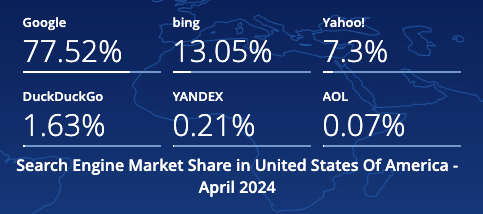 Screenshot from: https://gs.statcounter.com/search-engine-market-share/, May 2024.
Screenshot from: https://gs.statcounter.com/search-engine-market-share/, May 2024.Concurrently, competitors Microsoft Bing and Yahoo Search have seen gains. Bing reached a 13% market share in the U.S. and 5.8% globally, its highest since launching in 2009.
Yahoo Search’s worldwide share nearly tripled to 3.06%, a level not seen since July 2015.
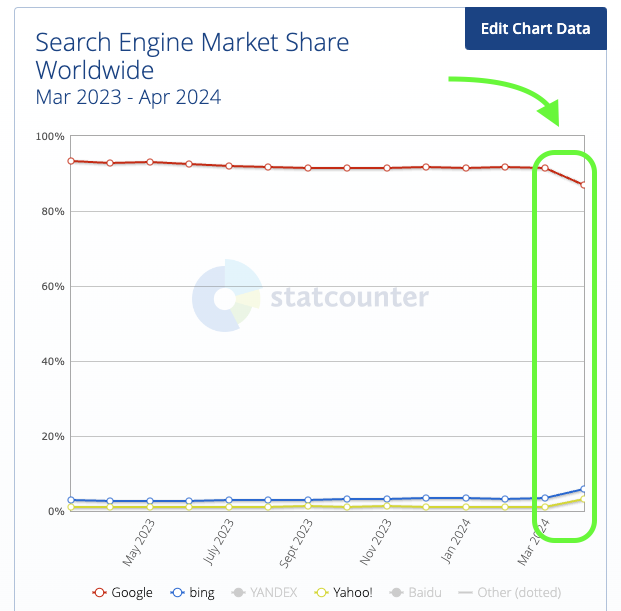 Screenshot from: https://gs.statcounter.com/search-engine-market-share/, May 2024.
Screenshot from: https://gs.statcounter.com/search-engine-market-share/, May 2024.Search Quality Concerns
Many industry experts have recently expressed concerns about the declining quality of Google’s search results.
A portion of the SEO community believes that the search giant’s results have worsened following the latest update.
These concerns have begun to extend to average internet users, who are increasingly voicing complaints about the state of their search results.
Alternative Perspectives
Web analytics platform SimilarWeb provided additional context on X (formerly Twitter), stating that its data for the US for March 2024 suggests Google’s decline may not be as severe as initially reported.
From our data (Search Engine website category, US, March 2024) it doesn’t look like we’re there yet: pic.twitter.com/RBUJp4ZLeb
— Similarweb (@Similarweb) May 1, 2024
SimilarWeb also highlighted Yahoo’s strong performance, categorizing it as a News and Media platform rather than a direct competitor to Google in the Search Engine category.
Don’t underestimate Yahoo. They’re doing great. On our platform they’re categorized as News and Media, and hence not a direct competitor to Google in the Search Engine category. But they rank #10 worldwide, #6 in the US, and #1 in their category. Much higher than Bing and OpenAI. pic.twitter.com/O4yJu5QEK6
— Similarweb (@Similarweb) May 2, 2024
At the same time, Google is slightly declining 👀 pic.twitter.com/9i7paeU1QG
— Similarweb (@Similarweb) May 2, 2024
Why It Matters
The shifting search engine market trends can impact businesses, marketers, and regular users.
Google has been on top for a long time, shaping how we find things online and how users behave.
However, as its market share drops and other search engines gain popularity, publishers may need to rethink their online strategies and optimize for multiple search platforms besides Google.
Users are becoming vocal about Google’s declining search quality over time. As people start trying alternate search engines, the various platforms must prioritize keeping users satisfied if they want to maintain or grow their market position.
It will be interesting to see how they respond to this boost in market share.
What It Means for SEO Pros
As Google’s competitors gain ground, SEO strategies may need to adapt by accounting for how each search engine’s algorithms and ranking factors work.
This could involve diversifying SEO efforts across multiple platforms and staying up-to-date on best practices for each one.
The increased focus on high-quality search results emphasizes the need to create valuable, user-focused content that meets the needs of the target audience.
SEO pros must prioritize informative, engaging, trustworthy content that meets search engine algorithms and user expectations.
Remain flexible, adaptable, and proactive to navigate these shifts. Keeping a pulse on industry trends, user behaviors, and competing search engine strategies will be key for successful SEO campaigns.
Featured Image: Tada Images/Shutterstock
SEO
How To Drive Pipeline With A Silo-Free Strategy

When it comes to B2B strategy, a holistic approach is the only approach.
Revenue organizations usually operate with siloed teams, and often expect a one-size-fits-all solution (usually buying clicks with paid media).
However, without cohesive brand, infrastructure, and pipeline generation efforts, they’re pretty much doomed to fail.
It’s just like rowing crew, where each member of the team must synchronize their movements to propel the boat forward – successful B2B marketing requires an integrated strategy.
So if you’re ready to ditch your disjointed marketing efforts and try a holistic approach, we’ve got you covered.
Join us on May 15, for an insightful live session with Digital Reach Agency on how to craft a compelling brand and PMF.
We’ll walk through the critical infrastructure you need, and the reliances and dependences of the core digital marketing disciplines.
Key takeaways from this webinar:
- Thinking Beyond Traditional Silos: Learn why traditional marketing silos are no longer viable and how they spell doom for modern revenue organizations.
- How To Identify and Fix Silos: Discover actionable strategies for pinpointing and sealing the gaps in your marketing silos.
- The Power of Integration: Uncover the secrets to successfully integrating brand strategy, digital infrastructure, and pipeline generation efforts.
Ben Childs, President and Founder of Digital Reach Agency, and Jordan Gibson, Head of Growth at Digital Reach Agency, will show you how to seamlessly integrate various elements of your marketing strategy for optimal results.
Don’t make the common mistake of using traditional marketing silos – sign up now and learn what it takes to transform your B2B go-to-market.
You’ll also get the opportunity to ask Ben and Jordan your most pressing questions, following the presentation.
And if you can’t make it to the live event, register anyway and we’ll send you a recording shortly after the webinar.
SEO
Why Big Companies Make Bad Content
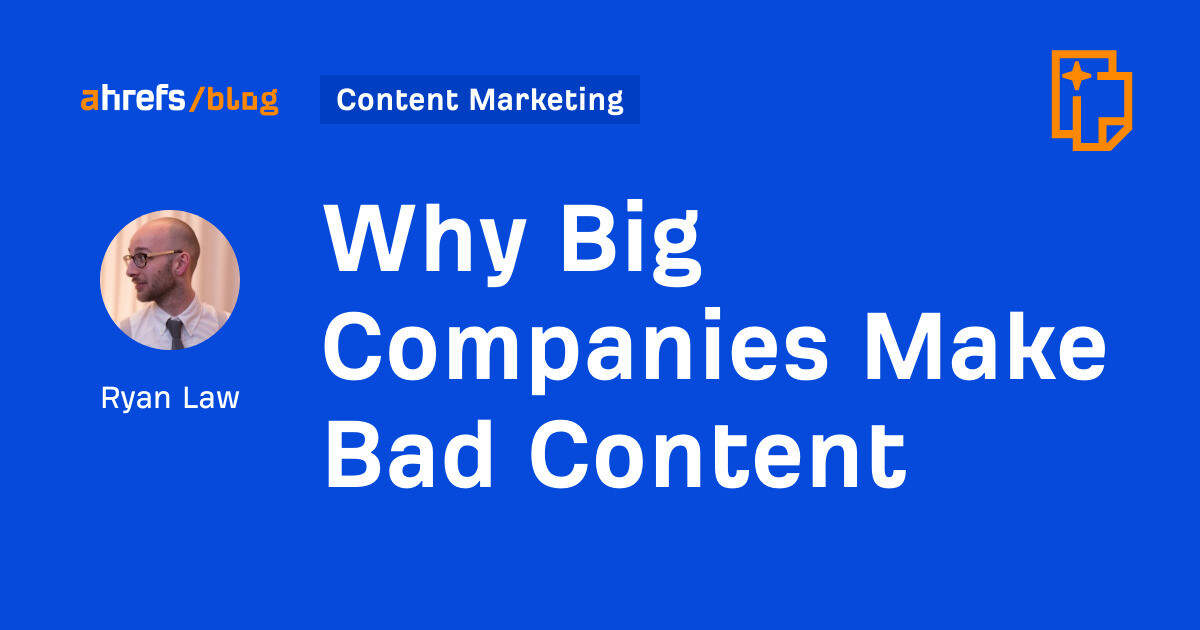
It’s like death and taxes: inevitable. The bigger a company gets, the worse its content marketing becomes.
HubSpot teaching you how to type the shrug emoji or buy bitcoin stock. Salesforce sharing inspiring business quotes. GoDaddy helping you use Bing AI, or Zendesk sharing catchy sales slogans.
Judged by content marketing best practice, these articles are bad.
They won’t resonate with decision-makers. Nobody will buy a HubSpot license after Googling “how to buy bitcoin stock.” It’s the very definition of vanity traffic: tons of visits with no obvious impact on the business.
So why does this happen?
There’s an obvious (but flawed) answer to this question: big companies are inefficient.
As companies grow, they become more complicated, and writing good, relevant content becomes harder. I’ve experienced this firsthand:
- extra rounds of legal review and stakeholder approval creeping into processes.
- content watered down to serve an ever-more generic “brand voice”.
- growing misalignment between search and content teams.
- a lack of content leadership within the company as early employees leave.
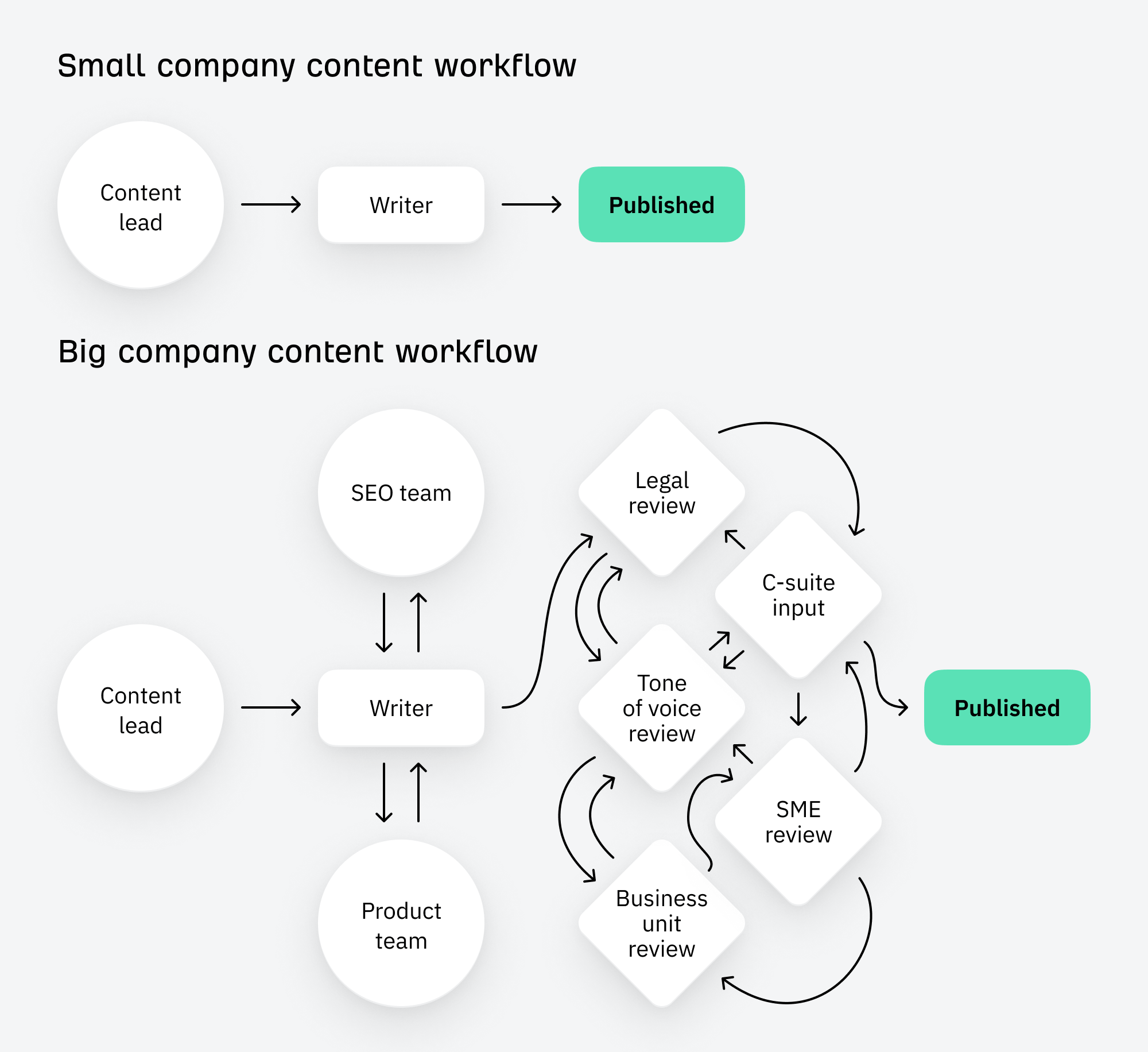

Similarly, funded companies have to grow, even when they’re already huge. Content has to feed the machine, continually increasing traffic… even if that traffic never contributes to the bottom line.
There’s an element of truth here, but I’ve come to think that both these arguments are naive, and certainly not the whole story.
It is wrong to assume that the same people that grew the company suddenly forgot everything they once knew about content, and wrong to assume that companies willfully target useless keywords just to game their OKRs.
Instead, let’s assume that this strategy is deliberate, and not oversight. I think bad content—and the vanity traffic it generates—is actually good for business.
There are benefits to driving tons of traffic, even if that traffic never directly converts. Or put in meme format:


Programmatic SEO is a good example. Why does Dialpad create landing pages for local phone numbers?
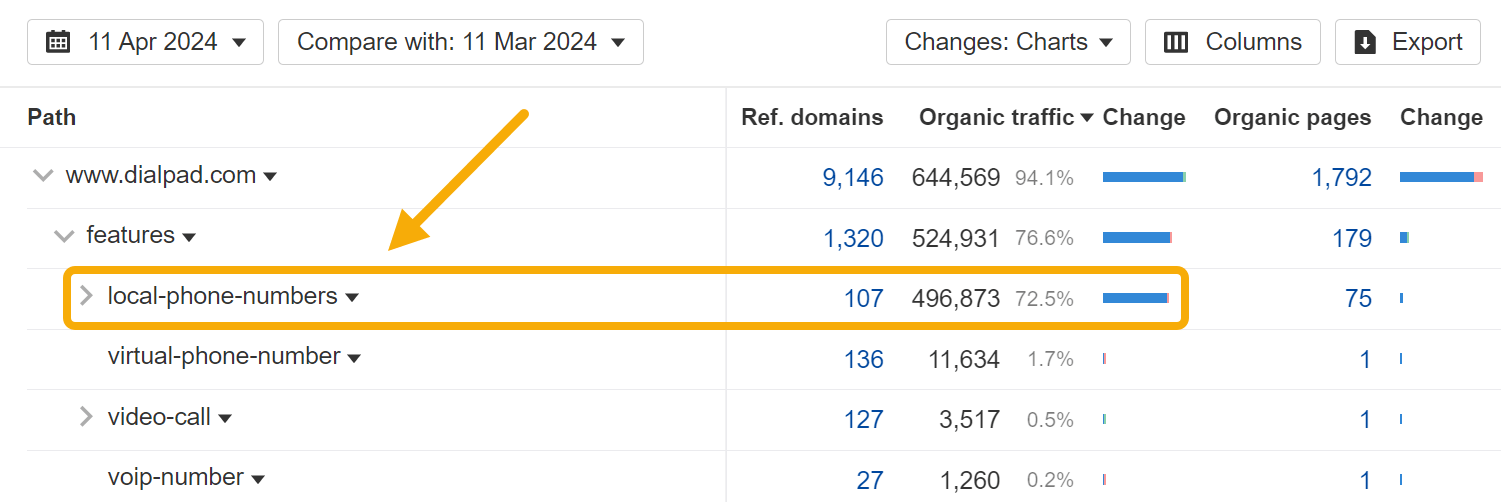

Why does Wise target exchange rate keywords?
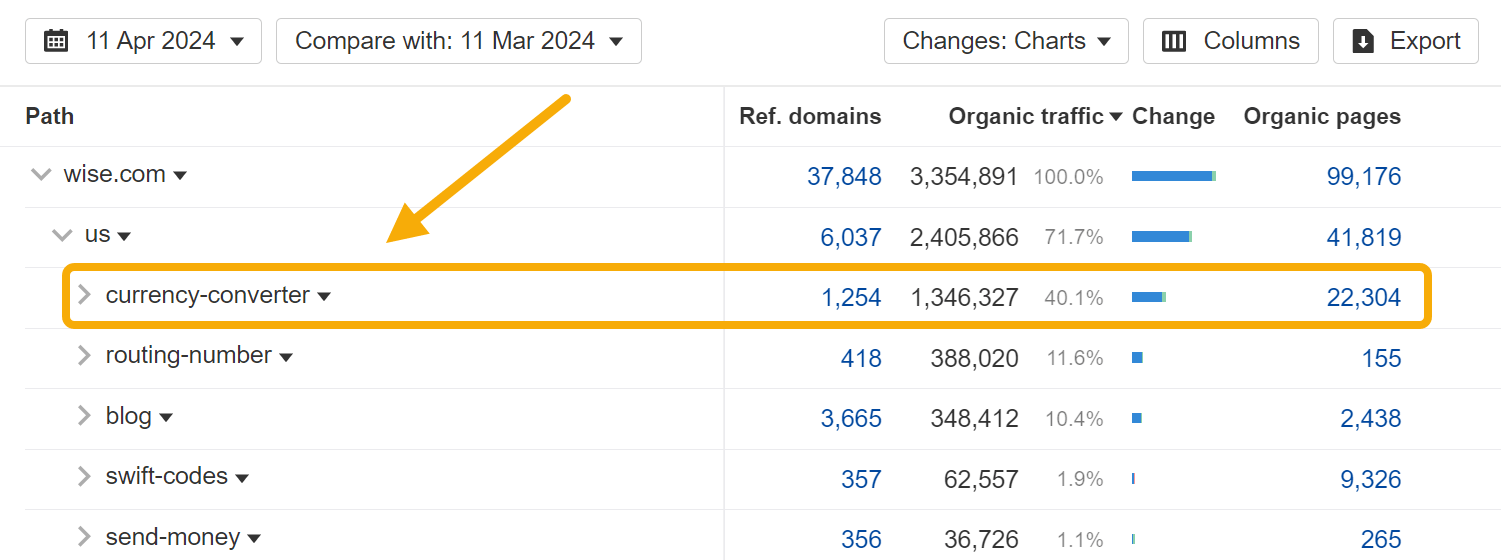

Why do we have a list of most popular websites pages?


As this Twitter user points out, these articles will never convert…
…but they don’t need to.
Every published URL and targeted keyword is a new doorway from the backwaters of the internet into your website. It’s a chance to acquire backlinks that wouldn’t otherwise exist, and an opportunity to get your brand in front of thousands of new, otherwise unfamiliar people.
These benefits might not directly translate into revenue, but over time, in aggregate, they can have a huge indirect impact on revenue. They can:
- Strengthen domain authority and the search performance of every other page on the website.
- Boost brand awareness, and encourage serendipitous interactions that land your brand in front of the right person at the right time.
- Deny your competitors traffic and dilute their share of voice.
These small benefits become more worthwhile when multiplied across many hundreds or thousands of pages. If you can minimize the cost of the content, there is relatively little downside.
What about topical authority?
“But what about topical authority?!” I hear you cry. “If you stray too far from your area of expertise, won’t rankings suffer for it?”
I reply simply with this screenshot of Forbes’ “health” subfolder, generating almost 4 million estimated monthly organic pageviews:
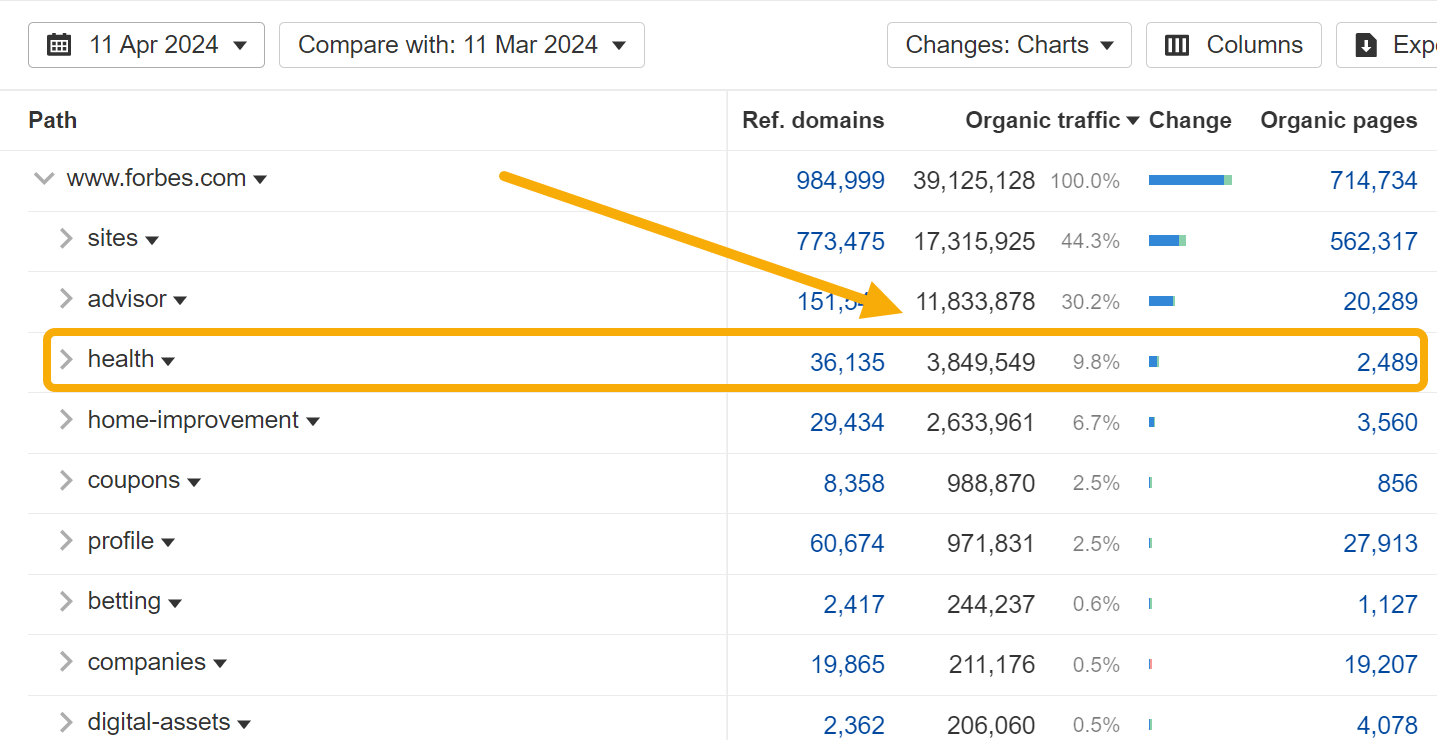

And big companies can minimize cost. For large, established brands, the marginal cost of content creation is relatively low.
Many companies scale their output through networks of freelancer writers, avoiding the cost of fully loaded employees. They have established, efficient processes for research, briefing, editorial review, publication and maintenance. The cost of an additional “unit” of content—or ten, or a hundred—is not that great, especially relative to other marketing channels.
There is also relatively little opportunity cost to consider: the fact that energy spent on “vanity” traffic could be better spent elsewhere, on more business-relevant topics.
In reality, many of the companies engaging in this strategy have already plucked the low-hanging fruit and written almost every product-relevant topic. There are a finite number of high traffic, high relevance topics; blog consistently for a decade and you too will reach these limits.
On top of that, the HubSpots and Salesforces of the world have very established, very efficient sales processes. Content gating, lead capture and scoring, and retargeting allow them to put very small conversion rates to relatively good use.


Even HubSpot’s article on Bitcoin stock has its own relevant call-to-action—and for HubSpot, building a database of aspiring investors is more valuable than it sounds, because…
The bigger a company grows, the bigger its audience needs to be to continue sustaining that growth rate.
Companies generally expand their total addressable market (TAM) as they grow, like HubSpot broadening from marketing to sales and customer success, launching new product lines for new—much bigger—audiences. This means the target audience for their content marketing grows alongside.
As Peep Laja put its:
But for the biggest companies, this principle is taken to an extreme. When a company gears up to IPO, its target audience expands to… pretty much everyone.
This was something Janessa Lantz (ex-HubSpot and dbt Labs) helped me understand: the target audience for a post-IPO company is not just end users, but institutional investors, market analysts, journalists, even regular Jane investors.
These are people who can influence the company’s worth in ways beyond simply buying a subscription: they can invest or encourage others to invest and dramatically influence the share price. These people are influenced by billboards, OOH advertising and, you guessed it, seemingly “bad” content showing up whenever they Google something.
You can think of this as a second, additional marketing funnel for post-IPO companies:
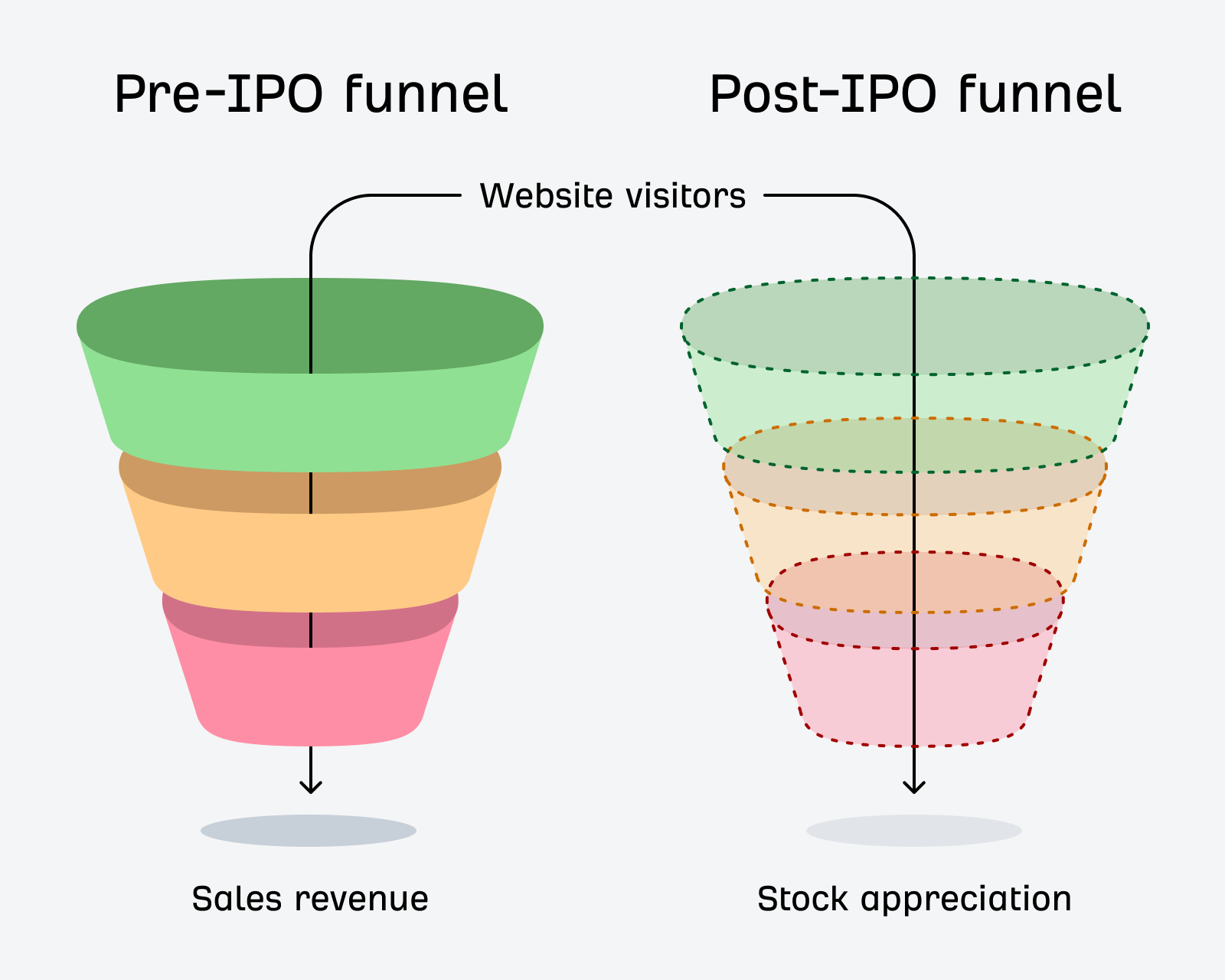

These visitors might not purchase a software subscription when they see your article in the SERP, but they will notice your brand, and maybe listen more attentively the next time your stock ticker appears on the news.
They won’t become power users, but they might download your eBook and add an extra unit to the email subscribers reported in your S1.
They might not contribute revenue now, but they will in the future: in the form of stock appreciation, or becoming the target audience for a future product line.
Vanity traffic does create value, but in a form most content marketers are not used to measuring.
If any of these benefits apply, then it makes sense to acquire them for your company—but also to deny them to your competitors.
SEO is an arms race: there are a finite number of keywords and topics, and leaving a rival to claim hundreds, even thousands of SERPs uncontested could very quickly create a headache for your company.
SEO can quickly create a moat of backlinks and brand awareness that can be virtually impossible to challenge; left unchecked, the gap between your company and your rival can accelerate at an accelerating pace.
Pumping out “bad” content and chasing vanity traffic is a chance to deny your rivals unchallenged share of voice, and make sure your brand always has a seat at the table.
Final thoughts
These types of articles are miscategorized—instead of thinking of them as bad content, it’s better to think of them as cheap digital billboards with surprisingly great attribution.
Big companies chasing “vanity traffic” isn’t an accident or oversight—there are good reasons to invest energy into content that will never convert. There is benefit, just not in the format most content marketers are used to.
This is not an argument to suggest that every company should invest in hyper-broad, high-traffic keywords. But if you’ve been blogging for a decade, or you’re gearing up for an IPO, then “bad content” and the vanity traffic it creates might not be so bad.
-
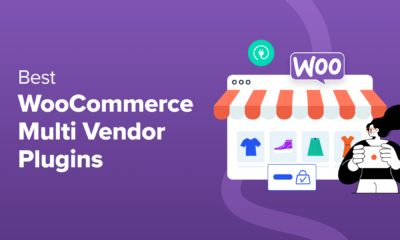
 WORDPRESS7 days ago
WORDPRESS7 days ago9 Best WooCommerce Multi Vendor Plugins (Compared)
-

 SEO6 days ago
SEO6 days agoGoogle March 2024 Core Update Officially Completed A Week Ago
-

 MARKETING5 days ago
MARKETING5 days agoNavigating the Video Marketing Maze: Short-Form vs. Long-Form
-

 SEARCHENGINES6 days ago
SEARCHENGINES6 days agoGoogle March 2024 Core Update Finished April 19, 2024
-
![The Current State of Google’s Search Generative Experience [What It Means for SEO in 2024] person typing on laptop with](https://articles.entireweb.com/wp-content/uploads/2024/04/The-Current-State-of-Googles-Search-Generative-Experience-What-It.webp-400x240.webp)
![The Current State of Google’s Search Generative Experience [What It Means for SEO in 2024] person typing on laptop with](https://articles.entireweb.com/wp-content/uploads/2024/04/The-Current-State-of-Googles-Search-Generative-Experience-What-It.webp-80x80.webp) MARKETING6 days ago
MARKETING6 days agoThe Current State of Google’s Search Generative Experience [What It Means for SEO in 2024]
-
SEARCHENGINES5 days ago
Daily Search Forum Recap: April 26, 2024
-

 WORDPRESS6 days ago
WORDPRESS6 days agoNew WordPress.com Themes for April 2024 – WordPress.com News
-
SEARCHENGINES3 days ago
Daily Search Forum Recap: April 29, 2024















